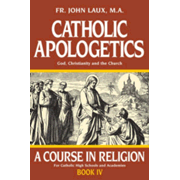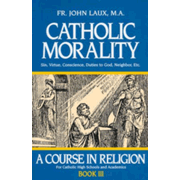A Course in Religion consists of four Catholic High School Religion Texts, Chief Truths of the Faith (Book I), Mass and the Sacraments (Book II), Catholic Morality (Book III), and Catholic Apologetics (Book IV). Originally published in 1928, these high school texts are still relevant today as the doctrine of the Catholic church is unchanging. The writing is clear and concise, and the topics engaging.
Parents who use the Baltimore Catechism with their younger students will find A Course in Religion a natural extension of those grade school catechism lessons, as Fr. Laux has based this course of study on the division and order of the larger Baltimore Catechism. Just as grammar students need to learn the basic elements and facts of Church teaching, high school students need to learn to use reason and form a worldview. Therefore, Father abandons the memory work that is associated with the Baltimore Catechism and instead encourages analytical thinking and clear reasoning.
Each book is well indexed so you can easily find topics and information. Every chapter ends with review questions and study suggestions to reinforce the lessons. The chapters also end with suggested reading lists. Unfortunately, many of the suggested books are no longer in print. Fr. Laux recommends that every student be supplied with a copy of the New Testament (for use throughout the course), Student's edition of the Missal (for use with Book II), and Thomas A Kempis' The Imitation of Christ (as supplementary material for Book III).
Book I (176 pages), Chief Truths of the Faith, is subtitled "Creation, Original Sin, Christ, Faith, Grace, Eternal Life, Etc." Using the Bible, Fr. Laux covers the major points of faith such as Holy Scripture, Tradition, the Blessed Trinity, the Immaculate Conception, and much more.
In Book II (199 pages), Mass and the Sacraments, subtitled "The Mass, Seven Sacraments, Indulgences, Sacramentals," Fr. Laux covers each of the seven sacraments in depth as well as the nature and celebration of the Holy Mass. Clear explanations and historical background are given regarding sacramentals and indulgences. The Ordinary of the Mass in both Latin and English is included in the appendix plus instruction on the altar, sacred vessels, and vestments. TAN has provided notes to the 1990 edition to explain changes in canon law and the differences between the Tridentine Mass and Novus Ordo.
Book III (163 pages), Catholic Morality, subtitled "Sin, Virtue, Duties to God, Neighbor, Etc.," explains the basic elements of Catholic moral teaching based upon the teaching of Holy Scripture. Fr. Laux gives students a clear understanding of Catholic principles in order to equip them with the necessary tools to lead a life in harmony with God's law. Covered topics include free will, moral good and evil, our duty to God, ourselves and others, and more.
Book IV (134 pages), Catholic Apologetics, is subtitled "God, Christianity, and the Church." Apologetics is the systematic argumentative discourse in defense of the origin and authority of the Church. Using logic and basic truths, this text provides the necessary tools to clearly answer the challenges that our teens will face when they leave home for college or the workplace. The fundamental truths are covered including the existence of God, the immortality of the soul, Biblical sources, the founding of the physical church, the papacy, and more.
All four books, which have the Imprimatur and the Nihil Obstat, may be purchased separately or as a set. [M. Wittmann]
Syllabi for Laux Texts
Three Religion Syllabi for studying the Father Laux Texts have been written by Laura Berquist. They are available through Mother of Divine Grace School rather than TAN Books.
Mother of Divine Grace School
P.O. Box 1810
Ojai, CA 93024
(805) 646-5818
www.motherofdivinegrace.org
The ninth grade syllabus is for Chief Truths of the Faith and Catholic Morality (Books I and II of A Course in Religion). Mass and the Sacraments and Catholic Apologetics (Books III and IV) are covered in the tenth grade syllabus. Introduction to the Bible is the third syllabus to be used in 11th grade.
Each syllabus includes 32 weeks of study based on a 4-day week, leaving Friday open for catch up or outside activities. Assignments that require parental involvement are scheduled for Mondays and Wednesdays. Directions are written for the student, saving time and work for the parent-teacher.
The syllabi include discussion topics and composition suggestions as well as quizzes (answers provided). Writing assignments can be coordinated with English studies. [M.Wittmann]













